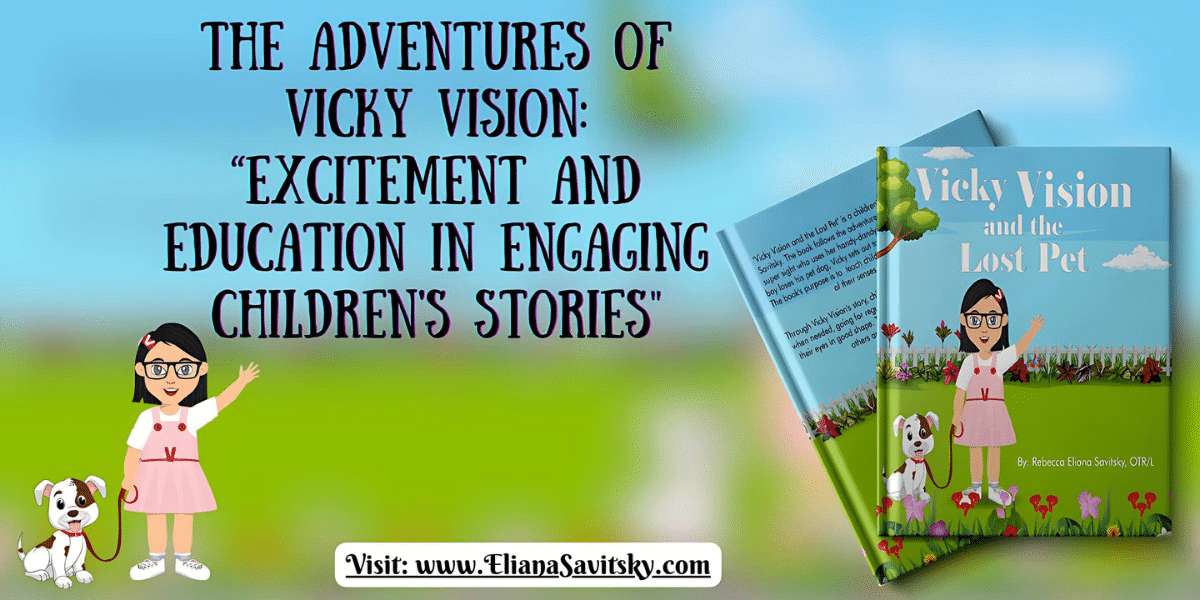By: Jason Gerber
As educational methods evolve to captivate the curious minds of children, Rebecca Savitsky’s “Vicky Vision and the Lost Pet” stands out as a novel approach to teaching sensory health. Through engaging storytelling, Savitsky creates delightful and informative narratives, offering young readers essential insights into caring for their senses.
This article explores how her narrative approach not only educates but also sparks the imaginations of young readers.
Bringing Sensory Health to Life
Vicky’s Vision is central to Savitsky’s educational approach. With her “handy-dandy glasses,” Vicky doesn’t merely observe the world—she discerns the subtle details that elude others. This talent is a potent metaphor, teaching children the critical role our senses play and the importance of caring for them. By embodying sensory health in Vicky, Savitsky concretizes abstract ideas into relatable and understandable experiences for young readers.
Storytelling as a Teaching Tool
Savitsky’s use of storytelling as a medium to discuss sensory health is deliberate and effective. Narratives have long been known to capture the attention of listeners and readers, allowing them to immerse themselves in worlds crafted by words. In “Vicky Vision and the Lost Pet,” the story acts as a vehicle for lessons on sensory care, engaging children’s natural curiosity and desire for stories while educating them. Each chapter builds on this knowledge, creating a learning experience that is as entertaining as it is educational.
Empathy and Community Care
A prominent theme in Savitsky’s “Vicky Vision and the Lost Pet“ is its focus on empathy. Vicky Vision leverages her unique ability to assist others, especially in finding lost pets. This narrative fosters a spirit of community care, teaching children the significance of helping others. The story effectively demonstrates how caring for one’s senses enhances the ability to positively impact society. Through her storytelling, Savitsky intertwines sensory health with values of kindness and communal responsibility, enriching her message with profound life lessons.
Practical Tips Integrated into the Tale
The adventure seamlessly integrates practical tips on maintaining sensory health into the storyline. Whether Vicky is choosing foods that are good for her eyes or explaining the importance of regular check-ups, these nuggets of wisdom are presented in a digestible and memorable way for young readers. Integrating educational content into exciting narratives ensures that children absorb and retain the information, possibly motivating them to adopt healthier habits.
Inspiring a Proactive Approach to Health
“Vicky Vision and the Lost Pet” teaches children about sensory health and inspires them to take a proactive approach to their well-being. By seeing how Vicky manages and benefits from taking care of her senses, children are encouraged to be mindful of their health. This proactive approach is crucial in early childhood development, where lifelong habits begin to form.
Conclusion
Rebecca Savitsky’s “Vicky Vision and the Lost Pet“ showcases storytelling as a powerful educational tool. Through Vicky Vision’s adventures, children learn vital sensory health, empathy, and community involvement lessons. This book is a must-have for parents and educators aiming to instill these values engagingly and effectively.
For those seeking to introduce young readers to the significance of sensory care and the rewards of altruism, “Vicky Vision and the Lost Pet” is an ideal choice. Start this enlightening journey with your children by picking up your copy today and watching them learn to view the world through Vicky’s exceptional Vision.
Visit: www.elianasavitsky.com
Published by: Khy Talara







